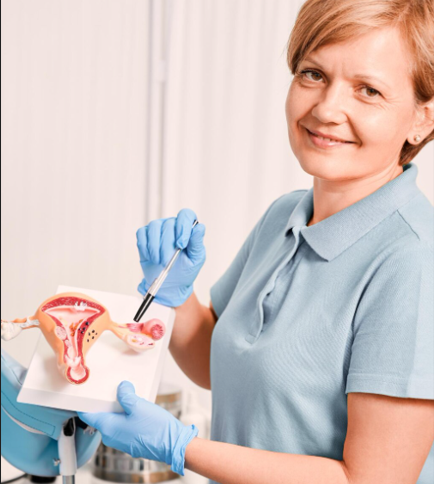Treatment Overview
Advanced Laparoscopic Hysterectomy in Korea represents one of the most refined and precise surgical approaches for uterine removal. This minimally invasive procedure utilizes high-definition 3D laparoscopy and micro-instrumentation to remove the uterus through small incisions, ensuring minimal trauma to surrounding tissues. Korean hospitals are globally recognized for integrating robotic and fluorescence-guided visualization systems, offering greater precision, reduced pain, and faster recovery. The approach is tailored to individual needs—whether for fibroids, adenomyosis, endometriosis, or uterine prolapse—ensuring both functional and cosmetic outcomes.
Purpose & Benefits
The main purpose of Advanced Laparoscopic Hysterectomy is to treat gynecologic conditions unresponsive to medication or less invasive options. It is frequently performed to manage chronic pelvic pain, abnormal uterine bleeding, fibroids, or malignancy.
Key benefits include:
- Significantly reduced post-operative pain and bleeding
- Shorter hospital stays and faster return to normal activities
- Minimal scarring with superior cosmetic results
- Enhanced visualization for precise dissection
- Lower risk of infection and complications compared to open surgery
Ideal Candidates
Ideal candidates for this surgery are women who:
- Suffer from large or multiple uterine fibroids
- Experience severe menstrual disorders or pelvic pain
- Have adenomyosis, endometriosis, or early-stage uterine cancer
- Require removal of the uterus due to structural abnormalities
- Seek a minimally invasive surgical solution with a quicker recovery period
Patients with overall good health and no contraindication for general anesthesia typically achieve the best outcomes.
Possible Risks & Complications
While Korea’s surgical precision and infection control greatly minimize risks, patients should be aware of potential complications such as:
- Bleeding or infection
- Injury to nearby organs (bladder, bowel, or ureters)
- Adverse reactions to anesthesia
- Post-operative adhesions or pelvic pain
- Rare risk of deep vein thrombosis or wound complications
These risks are significantly reduced when procedures are performed by Korea’s highly trained laparoscopic surgeons.
Surgical Techniques Used
Korean gynecologic surgeons employ multiple advanced techniques for hysterectomy depending on the patient’s condition:
- Total Laparoscopic Hysterectomy (TLH) – Complete uterus removal using 3D laparoscopic visualization.
- Laparoscopic Supracervical Hysterectomy (LSH) – Removal of the upper uterus while preserving the cervix for pelvic support.
- Robotic-Assisted Laparoscopic Hysterectomy (RALH) – Using da Vinci® robotic systems for superior precision and minimal blood loss.
- Single-Port Laparoscopic Hysterectomy – Aesthetic, scar-free method through the navel using a single incision.
- Fluorescence-Guided or Image-Guided Surgery – Enhances visualization of tissues and vascular structures for ultra-safe dissection.
Recovery & Aftercare
Patients typically stay in the hospital for 1–2 days after the procedure, with most returning to normal activities within two weeks.
Aftercare includes:
- Pain management and antibiotic therapy
- Gentle ambulation to promote blood circulation
- Avoiding heavy lifting for 4–6 weeks
- Regular follow-ups for incision care and internal healing
Korean post-surgical recovery programs often include personalized nutrition, physiotherapy, and hormone balance monitoring for holistic healing.
Results & Longevity
The results of an Advanced Laparoscopic Hysterectomy are long-lasting and transformative. Symptoms such as chronic bleeding, pelvic pain, and pressure are usually completely resolved. Patients experience improved quality of life, enhanced mobility, and better overall health stability. The long-term outcomes are excellent, with recurrence of symptoms being extremely rare.
Treatment Process in Korea
Korea has become a global destination for advanced gynecologic surgeries due to its precision technology, world-class infrastructure, and patient-focused medical culture. The treatment process typically includes:
- Comprehensive diagnostic imaging and hormone evaluation
- Customized surgical planning using 3D mapping and AI-assisted visualization
- Minimally invasive surgery with robotic or high-definition laparoscopic systems
- Rapid recovery programs emphasizing minimal scarring and early mobilization
Korean hospitals integrate unique technologies such as Fluorescence Imaging, AI-based surgical navigation, and robotic precision instruments, setting global benchmarks for hysterectomy success rates. Medical centers in Seoul and Busan are also known for their international patient programs offering multilingual assistance, luxury recovery suites, and personalized care coordination.
Cost Range
The cost of an Advanced Laparoscopic Hysterectomy in Korea typically ranges between USD 6,000 to USD 12,000, depending on the hospital, surgeon expertise, and technology used (standard laparoscopic vs. robotic-assisted). The package usually includes preoperative assessments, anesthesia, surgery, hospitalization, and post-operative care. Compared to Western countries, Korean medical centers offer significantly lower costs while maintaining globally accredited quality standards.
Popular Clinics
- Severance Hospital (Yonsei University Health System, Seoul) – Renowned for robotic gynecologic surgery and advanced women’s health programs.
- Asan Medical Center (Seoul) – One of Asia’s leading centers for complex laparoscopic hysterectomies.
- Samsung Medical Center (Seoul) – Offers integrated robotic and fluorescence-guided hysterectomy systems.
- CHA Gangnam Medical Center – Specializes in minimally invasive and fertility-preserving gynecologic surgeries.
- Ewha Womans University Medical Center – Recognized for women-centered care, advanced endoscopic surgery, and international medical services.




